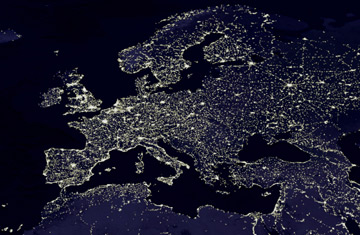
It is a little over half a century since I joined the Financial Times as a feature writer and found myself writing about the threat to Europe's oil supplies from Colonel Nasser's closure of the Suez Canal. It is a little over a quarter of a century since Margaret Thatcher appointed me U.K. Energy Secretary. So one way and another, I have been a close observer of the energy scene for quite a long time now. But I cannot recall a time when it was arguably more dangerous, or certainly more bizarre.
Discussion of energy in Europe today tends to be dominated by what are described as environmental issues, chiefly the question of carbon emissions and global warming. So much so, in fact, that the rather more urgent matter of security of supply is all too often overlooked.
But it is now becoming acute. It has two dimensions. The first relates to the potential unreliability of our sources of primary energy. We have long been used to the fact that our oil comes overwhelmingly from the endemically unstable Middle East — an instability that in the age of al-Qaeda has grown, just when the decline of North Sea oil is increasing our dependence on it. But Europe is now, in addition, substantially and increasingly dependent on Russian gas to fuel its power stations. As Javier Solana, the E.U.'s High Representative for Foreign and Security Policy, delicately put it earlier this month, "There is justified concern across Europe about Russia seeming more interested in investing in future leverage than in future production." Not that Europe is doing anything about it, by way of constructing adequate gas storage to meet any interruption of supply.
But the greater threat to Europe's energy supply lies at home, in the looming prospect of a growing gap between demand for electricity and the capacity of power stations to supply it. The problem is probably most acute in Germany, which is committed — on politically compelling but rationally inexplicable grounds — not only to building no more nuclear power stations, but to closing down those it already has. But environmental opposition to building conventional, fossil-fuel power stations, because of the carbon-dioxide emissions these cause, is also strong and growing stronger, supported by the environment wings of Europe's governments.
As a result, it has been calculated that Germany will lose some 25% of its electricity-generating capacity by 2030; and today, it is only barely sufficient for the country's needs. Germany hopes to import the electricity shortfall from France, which generates roughly three-quarters of its electricity from nuclear power, and is happy to do so. But France will not generate enough to satisfy Europe's growing shortfalls. For Germany is by no means alone.
The essence of the problem is the reduction of emissions to which Europe has committed itself, coupled with largely environmental planning delays. A top executive at E.On, Germany's largest energy group, recently pointed out that, while nuclear power stations take a long time to build, partly because of the very necessary safety standards that have to be met, in Europe it takes even longer to get a planning application approved.
But the position is little better with coal-fired power stations, which are more economic than nuclear power and rely on an indigenous fuel supply which exists in abundance. The British government is expected to approve, subject to it satisfying a host of conditions, the construction of the first coal-fired power station to be built in the U.K. for decades — as it happens, by E.On — at Kingsnorth in England. One of those conditions, which the government proudly trumpeted, was that it should be fitted with carbon-capture and storage technology (CCS).
This is a wonderful solution to the emissions and energy-security problem, since the carbon dioxide produced by burning the coal is captured and buried deep underground, rather than being let loose in the atmosphere. There is only one snag: the technology does not exist. It may, in 10, 20 or 30 years' time: there is growing R&D activity in this sphere. Or it may not: as the present Chancellor of the Exchequer, Alistair Darling, told the House of Commons early last year, when he was the minister responsible for U.K. energy policy, the technologies required for commercial CCS "might never become available." Not surprisingly, Whitehall has now discreetly dropped the CCS condition for Kingsnorth.
All in all, the likelihood of the lights going out in Europe at some point over the next 20 years has never been greater. But the chances are that, although there may be occasional blackouts, the gap between supply and demand will be met partly by a substantial rise in the price of electricity and partly by reducing demand as Europe gradually becomes a manufacturing-free zone, as its industries migrate to China, India, Turkey, Morocco, or anywhere where planning delays are negligible and electricity is cheaper. This is not, of course, going to reduce global emissions at all; but we can perhaps console ourselves that it is a more useful form of overseas aid than most. But it is, as I said, bizarre.
Lawson is Britain's former Chancellor of the Exchequer and Energy Secretary